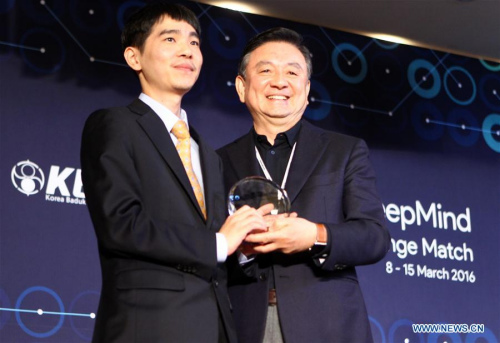
Hong Seok-Hyun (R), chairman of South Korea's Baduk Association, awards South Korean professional Go player Lee Sedol after Lee finished the final match of the Google DeepMind Challenge Match against Google's artificial intelligence program, AlphaGo, in Seoul, South Korea, March 15, 2016. Google's Go-playing computer program again defeated its human opponent in a final match on Tuesday that sealed its 4-1 victory. (Xinhua/Yao Qilin)
When AlphaGo defeated Lee Sedol, one of the world's top Go players, 4:1 on Tuesday, China's artificial intelligence community decided it was time to take AI to the people.
The people, in this case China's online community, have plenty of suggestions.
Imagine using the AI technology to invent a poker machine complete with a computer vision gear allowing it to recognize human motions and gestures. Contests would be more humane rather than a cold-hearted contest of computing prowess, a web users said after watching the contest.
Others want to see Google's DeepMind team come up with AlphaMahjong to take on China's most popular four-handed pastime which features slippery concepts like teamwork and cooperation
"The response of these fans are a good reminder that research must meet a realistic demand. I think many people want to take on AI machines at their favorite pastimes via their phones or laptops," said Xu Li, CEO of SenseTime, a Chinese AI company which specializes computer vision.
That kind of interaction is currently restrained by the hardware. Such superior AI technology is still impossible to run on home computers or the smartest of phones, but that is sure to change.
By challenging one of the world's top Go players, AlphaGo has propelled itself to the high ground of AI research and development. AI may still be out of reach for most of us, but now it is at least in sight.
The rules of Go are incredibly simple, which leads to very complex strategic possibilities. In preparation for the match, AlphaGo was said to have played over 30 million matches against itself and invented its own strategy through the mass of data generated. Every game it plays adds to its experience and makes it better.
"Without challenging the best players in the world, AI could never develop so quickly, but we must remember that technology is not to build a castle in the clouds but to improve people's lives. That's the direction AI scientists should be working in," said Xu.
Martin Hudecek from the Czech Republic, who has worked in the AI industry in China for three years is impressed by improvements he has seen in that time.
"Chinese engineers are very good at solving practical problems and completing the task in hand, but they need to think more globally and dream bigger dreams like Google," Hudecek said.
More creative and product-oriented, the new generation of Chinese researchers are already dreaming big AI dreams. Guo Rui of Roobo, a Chinese company working on family robots, has an just such a dream. His team are perfecting robots to take care of the elderly and to befriend children. "We have no shortage of ideas. What we need are the resources to realize them," said Guo.
Andrew Ng, also known by his Chinese name Wu Enda, founder of Google Brain, is now head of Baidu's AI labs.
It is in the computer vision sector where Chinese scientists have taken the lead and seen the most progress in commercial use.
In December, SenseTime became the first Chinese company to win the ImageNet contest, the "Olympics of the Computer Vision Industry." Computer vision technology is used in surveillance, shopping malls, social media, and mobile phones.
In the draft 13th Five-Year Plan, currently being reviewed by China's National People's Congress, intelligent manufacturing and robot production feature prominently. Though detailed policies are yet to be released, the hopes of the domestic AI industry are high.
Lei Yu, Roobo vice-president, expects breakthroughs in the sectors of smart drones, smart home systems and intelligent medical services.
To reach that goal, policy must be directed toward full, open-minded exchanges among AI researchers and support for new ideas, said he.


















































